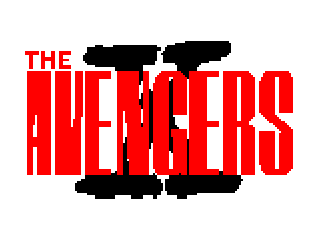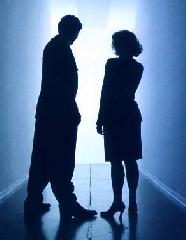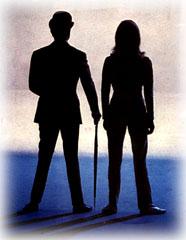
Flipping through old papers I found an article which was giving a critical analysis of all The X-Files episodes that had been aired (seasons one to three) and it concluded that the spin-offs the show had created had flopped because they suffered from something only The X-Files possessed -- its connection with The Avengers. Well, not quite. The article actually said, “... the one obvious drawback all the imitators suffer is the absence of Mulder and Scully -- a Steed and Emma for the Nineties.”1. Steed and Emma? The reference is to John Steed (Patrick Macnee) and Emma Peel (Diana Rigg) of that wonderful Sixties show, The Avengers, and their similarity to Fox Mulder (David Duchovny) and Dana Scully (Gillian Anderson) of the Nineties show, The X-Files. This influenced me to think about the similarities between the two shows further and, after some research, it appeared as if The X-Files was, in fact, The Avengers in the Nineties. Starting with the comparisons of episodes and going on to character similarities also, this essay is compiled to help prove my point.
The Avengers, like The X-Files, have a die-hard cult following called Avengerphiles. The X-Files fans are called X-Philes. (Hmm... spooky coincidence...?) While The X-Files’ duo work for the F.B.I., The Avengers worked for M.I.5 or M.I.6., something which was never really fully established. (Macnee once joked that The Avengers worked for M.I.5˝.) The Avengers, in any case, was ahead of its time, which makes their similarities to The X-Files even more so because, although they were technologically inapt, the ideas were there and these ideas have developed over the years and modern science had made them possible.
As a starting point, then, we can see that both shows have the lead characters working in a high position within the government, something which often aids them in their investigations. Mulder and Scully definitely use this to their advantage whenever possible, whereas Steed and Emma were less inclined to flash their I.D.s, their work being mainly secret and undercover.
Both shows have the basic threads of action and adventure. Both duos track everyday troublemakers and ‘baddies’, only in The X-Files, the twist is that these ‘baddies’ have paranormal links. While The Avengers doesn’t indulge in aliens and general paranormal scenes, it does have its own share of science-fiction. One episode that springs to mind is the body-swapping episode in Season Five’s Who’s Who???. The Avengers are individually knocked unconscious and hooked up to a machine that makes them swap minds with the enemies, Basil and Lola. In The X-Files, the situation is slightly different but the thread is still there. The episode is Season Six’s Dreamland and the second-parter Dreamland II where Mulder and ‘shadowy’ government worker, Morris Fletcher, unintentionally swap bodies after a U.F.O. fly-by in Area 51. While Mulder (like Steed and Emma) is anxious to get back to his normal body, Fletcher (like Basil and Lola) finds the swap most exciting and intends to keep it that way. The endings of the episodes are almost identical too - Steed and Emma trick their enemies into swapping back, just as Mulder and Fletcher are made to return to the positions they were in on the first fly-by so, when it occurs again, the effect is reversed.
These mirror-like episodes even have in-jokes at the end. The Avengers ends with Emma’s birthday where Steed surprises her with plane tickets. She calls him ‘Basil’ and he calls her ‘Lola’, a reference to the enemies names, making the viewer wonder if they really are our heroes and not the enemies still. In the case of The X-Files, time is also reversed, so cue to Mulder’s confusion when he finds that his usually messy apartment has been cleaned and that his previously unseen bedroom has been discovered and done up as well. This was done by Fletcher in an attempt to impress Scully, and ultimately, gave him away as being the ‘fake’ Mulder. As time has been reversed but not the actions, Mulder is understandably confused at the situation, remarking as the title credits appear, “What the hell is this?!”
Another episode that springs to mind is that of The Avengers’ Season Four episode The Cybernauts and its sequel in Season Five The Return of the Cybernauts. In these episodes, Dr. Armstrong (and in the sequel, his brother) invents the Cybernaut, a robot capable of being controlled via radio signals to kill important figures. The second episode is more important as Dr. Armstrong’s brother, Paul Armstrong, is determined to exert revenge on The Avengers and makes Emma his ‘human’ Cybernaut, turning her into a mere ‘puppet’. This sounds like something straight out of The X-Files, but the nearest the show has got to robots is in the form of that little computer on wheels in Season Three’s War Of The Coprophages, unless you include the killer-computer in Season One’s Ghost In The Machine. In Clyde Bruckman’s Final Repose, the killer was called ‘The Puppet’, but he was his own victim rather than someone else’s puppet. The making of a human puppet comes in the form of Season Three’s Pusher and Season Four’s Kitsunegari. Robert ‘Pusher’ Modell makes unwilling victims his human puppets through a tumour in his brain and makes Mulder his ‘puppet’ in a deadly game of Russian Roulette (Pusher). In a later episode, Modell makes Mulder his aide, resulting in Mulder suggesting theories which would lead to exonerating Modell from murder (Kitsunegari). In the same episode, Modell is hospitalised after being shot and Modell’s sister kills her brother in the same way Modell killed his victims -- by the power of mind. She then makes Mulder try to kill Scully in revenge for Modell’s condition, which had lead her to kill him.
Another example? The Avengers’ Season Four episode Silent Dust saw a deadly fertilizer being used to kill farmland and practically anything else it came across. A dead ringer for this episode is The X-Files’ Season Five episode The Pine Bluff Variant where the killer compound is a deadly biochemical weapon, exactly the same as the Silent Dust but just more scientifically produced. After all, this is the Nineties.
So what we have so far is a number of episodes that seem to echo each other. Not that I think it was intentional or even realised at the time of filming, but it seems as if The X-Files has almost taken the formula of The Avengers and incorporated it into their show. The likelihood of this actually being true is very unlikely but it does bear thinking about. I will now turn to that other important aspect of the two shows and that is the characters of the leads themselves.
So it is not only the episodes and the themes that make the two shows attractive and alike -- it is also their well-written scripts, carefully constructed scenes, witty dialogue and on-screen chemistry, the latter of which has seems to have grabbed the most attention in both cases. It is very important that the leads have a good rapport between them in order for the show to work, and both Macnee & Rigg and Duchovny & Anderson have this in abundance. Their characters are unique and individual and yet they are treated as equals. They have done away with the situation where the woman is always rescued by the man, a ‘damsel-in-distress’ tone which many shows have. The characters of Emma and Scully have had situations where they have rescued their male counterparts, although Emma did not get this chance as often as Scully. This is probably something to do with opinions within the show’s creators and feelings about not keeping ‘in’ with the usual formula of the male always rescuing the female.
As to whether Mulder and Scully should get together in The X-Files, the same thing was discussed as Rigg’s departure from the show was impending. The viewers love the leads and want them to love each other too. Instead, the characters moved towards a mutual love that seemed to surpass the conventional love that the fans initially wanted. By this, I mean that they did not need to kiss or show physical affection to express their feelings towards each other. This almost brother-sister relationship is perfect and keeps the drive going, while a show with the characters showing their feelings in a more physical way (i.e. kissing, having a sexual relationship) would undoubtedly kill the main objective of the show. With this sexual ‘chemistry’ and overall physical attractiveness (all four have been voted the sexiest of their gender at some point in their careers), it is exasperating for the romantic fans as they watch the leads grow closer and closer with each episode, but never quite reaching the point of ‘getting together’. In this way, the tension is maintained at a high level and the show thrives and lives on.
This is the general prediction of why The Avengers failed to recapture its sparkle after Rigg left the show. Her replacement was in the form of the naive and inexperienced Linda Thorson, whom, never being in front of a camera before The Avengers, meant that she could hardly generate the sort of acting that had been performed by her more experienced predecessor. The New Avengers was not much better, but this had more to do with the poor writing rather than the acting. This was the general fear of X-Philes when they heard rumours of Duchovny and Anderson being replaced -- the chemistry would never be the same and the show would fade away. Luckily for X-Philes, Duchovny and Anderson are scheduled to stay until the end that will be Season Seven.
With these comparisons in mind, I think that it is safe to say The X-Files is The Avengers set in the Nineties. Whether the creator of The X-Files, Chris Carter, intended it to be this way, who knows? It is known, however, that The X-Files is supposedly based on the old series of Kolchak: The Night Stalker. I think that maybe Carter may have also subconsciously tapped into the winning formula of The Avengers at the same time, the idea being at the back of his mind but never fully surfacing as to where he got the idea from. I doubt he deliberately intended to ‘copy’ another show’s formula, least of all that from The Avengers, but the similarities between the two shows are rather similar.
I am off to watch The Avengers with aliens and shadowy government types -- otherwise known as The X-Files.
Footnotes:
Bibliography:
1. J. Abbot, Themes of The X-Files, Dreamwatch Magazine, 1996.
· D. Roger, The Ultimate Avengers, Lumiere Ltd, 1995.
· The Official X-Files, http://www.thex-files.com, 1999.
Clare Benton
The X-Files University
School of General Studies
Dean: Rebecca Bateman
4th June 1999
© Clare Benton


And you're telling me it's all a coincidence...?

--Back to Athene19's Guide for X-Philer Wannabes
--Back to Athene19's Tribute to The Avengers
--Back to Athene19's Cult TV
--Back to Athene19's Ancient Myths and Modern Cult